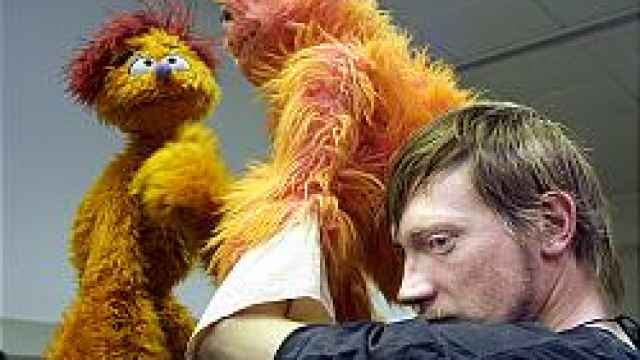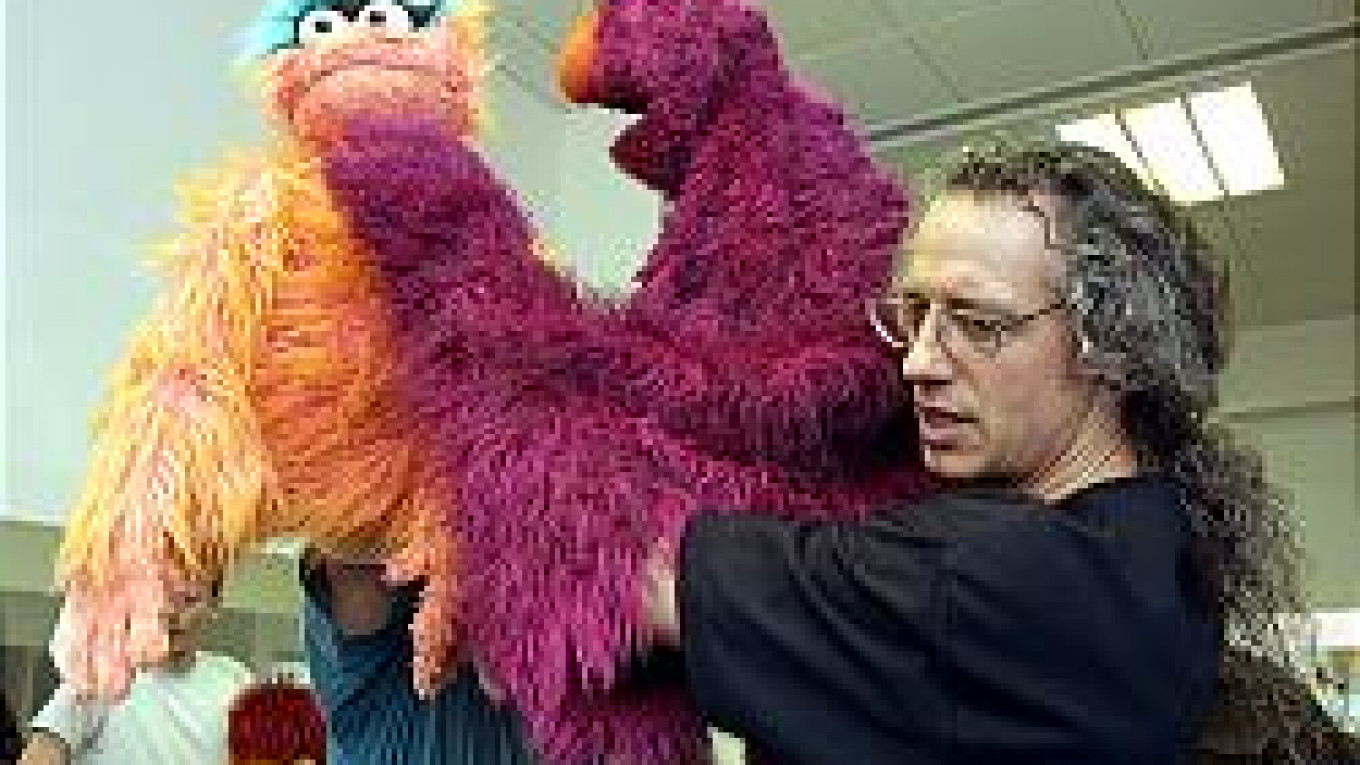"That was great. I liked your technique, your position," said Robinson, who is the puppeteer who plays the characters Telly and Snuffleupagus on the U.S. children's show "Sesame Street." The young men nodded, listening intently to the more experienced puppeteer.
"But it [you and your puppet] was like two talking heads," Robinson continued. "There was no movement. Puppets work best when they're moving."
To demonstrate, he picked up his own puppet, Telly, and moved about the room, reciting lines from the audition script.
"I didn't sleep last night. I was counting the stars," Telly bellowed. "But I only counted three. Maybe tomorrow night I'll count more!"
By the end of the day, one of the five puppeteers would be cast as Kubik, one of the main characters on "Ulitsa Sezam," the Russian version of "Sesame Street."
"Ulitsa Sezam" begins filming its third season this week, after a hiatus of nearly three years.
But despite the long break and the introduction of a new production company, DIXI-TV, the show's list of characters, as well as the cast that plays them, will remain the same -- with the exception of the puppeteer who plays Kubik, who is no longer with the show.
Robinson, who is in Moscow this week to cast and train the new Kubik puppeteer, promised that the third season of "Ulitsa Sezam" will be nearly identical to the first two.
"We have an obligation to the children of Russia not to jar them with a huge change," he said, adding that "Ulitsa Sezam's" young viewers won't notice any break in the continuity between the show's third season and the first two.
He also stressed that "Ulitsa Sezam" is more than just "Sesame Street" in Russian translation.
"Written and produced by Russians, it has its own characters, stories and methods to prepare Russian preschoolers for school," he said.
 Mike Solovyanov / MT Sergei Shabayev, right, auditioning for the role of Kubik, the yellow puppet on the left. | |
"To think of the international co-productions as carbon copies of the U.S. production would be very wrong. It's all written locally, and very much with the country's people and the country's needs in mind."
Like the U.S. "Sesame Street," "Ulitsa Sezam" uses plot, characters, animation, short documentary films and song to improve young children's cognitive skills, literacy, creative thinking and social skills.
The show is set in a dvor, or courtyard, where 8-year-old music student Katya plays with the dvor's kindly caretaker, Tyotya Dasha, or Aunt Dasha.
The duo are joined by three main puppet characters: Kubik, the boy scientist; Businka, a girl who loves to dance; and Zeliboba, a furry blue dvorovoi, or courtyard spirit.
All of the puppets are Muppets created in the Jim Henson Muppet Workshop. Robinson trains puppeteers for all of the international versions of "Sesame Street" on how to use the Muppets. He also occasionally helps to cast puppeteers, as with Kubik, and said he takes great pains to make sure his casting choices are appropriate.
"I rely very heavily on my interpreter, and not just to interpret words," Robinson said. "I rely on her to tell me if something is funny, if the diction is good, if there's a regionalism to the accent -- things that as an outsider I'll never know. She's my liaison not just to the language but to the culture."
Ginger Brown, senior producer at the show's international headquarters in New York, the Sesame Workshop, has read the "Ulitsa Sezam" scripts and said she saw in them a uniquely Russian character.
"What they [Russians] think is important is that every child can appreciate other children, in the regions and in the world," Brown said. "There's a unique appreciation of music and the arts, and for hard work. They model that in their films and productions.
"But there's always a sense of play and of humor. The humor is essentially Russian," she added.
"Ulitsa Sezam's" third season is remarkable, Brown said, because it includes an unusually large amount of original, Russian-produced content: 70 percent. Only 30 percent of the show's scripts was taken from libraries of U.S.-produced material, such as segments with Bert and Ernie -- only here they're known as Vlas and Enik.
Brown added that the Sesame Workshop, which reviews the scripts for all international versions of "Sesame Street," will attempt to ensure that "Ulitsa Sezam" reflects Russian -- not American -- cultural values.
"If there's a disagreement, the Russians are always right," she said.
The show's scripts are written with help from Russian experts in fields such as child development and early education. The Education Ministry also participates in choosing show themes.
"What the Education Ministry feels a child in Russia needs to get ready for school is really advanced, more advanced than in other countries," Brown said.
She said the Education Ministry has backed "Ulitsa Sezam" since it began production in 1994, and that its support has been of "incredible value."
But "Ulitsa Sezam" has traveled a bumpy road to reach its third season. The first season took two years to prepare, in part due to the extensive research involved, and in part due to bureaucratic problems in getting funding from USAID and the Soros Foundation. The fact that both the Russian economy and broadcasting industry were in difficulty didn't help either.
By the time "Ulitsa Sezam" was ready to produce its second season three years after the first, personnel changes at the original production company, Video Art, prompted a switch to a new company, a change Brown calls "labor-intensive."
The second season hit the airwaves in 2000, and various television stations have been airing reruns ever since. Brown said the third season will hit the airwaves this fall, this time with DIXI-TV producing and Nestle providing funding.
"Ulitsa Sezam" will air weekly on CTC beginning in November.
A Message from The Moscow Times:
Dear readers,
We are facing unprecedented challenges. Russia's Prosecutor General's Office has designated The Moscow Times as an "undesirable" organization, criminalizing our work and putting our staff at risk of prosecution. This follows our earlier unjust labeling as a "foreign agent."
These actions are direct attempts to silence independent journalism in Russia. The authorities claim our work "discredits the decisions of the Russian leadership." We see things differently: we strive to provide accurate, unbiased reporting on Russia.
We, the journalists of The Moscow Times, refuse to be silenced. But to continue our work, we need your help.
Your support, no matter how small, makes a world of difference. If you can, please support us monthly starting from just $2. It's quick to set up, and every contribution makes a significant impact.
By supporting The Moscow Times, you're defending open, independent journalism in the face of repression. Thank you for standing with us.
Remind me later.


